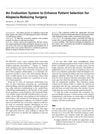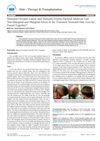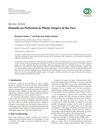 5 citations,
September 2016 in “Journal of Cosmetic Dermatology”
5 citations,
September 2016 in “Journal of Cosmetic Dermatology” Nourkrin® with Marilex® may increase hair count by 35.7% in postpartum hair loss.
 1 citations,
May 2016 in “Current Opinion in Pediatrics”
1 citations,
May 2016 in “Current Opinion in Pediatrics” Children's hair loss can be caused by various factors and should be treated with appropriate, age-specific methods and psychological support.

Doctors should consider Netherton syndrome in patients with chronic skin and hair issues to avoid misdiagnosis.
 7 citations,
May 2014 in “Clinical practice”
7 citations,
May 2014 in “Clinical practice” Cooling the scalp may prevent hair loss from chemotherapy, hair often grows back after treatment, and nail issues usually improve after stopping the drug.
 41 citations,
December 2008 in “International Journal of Dermatology”
41 citations,
December 2008 in “International Journal of Dermatology” South Korean women with hair loss have lower hair density and thickness compared to healthy women.
 March 2013 in “Revista Brasileira de Cirurgia Plástica”
March 2013 in “Revista Brasileira de Cirurgia Plástica” Using platelet growth factors can improve hair density in transplants, especially for those with fine hair.
 16 citations,
December 2012 in “The Clinical Journal of Pain”
16 citations,
December 2012 in “The Clinical Journal of Pain” Chronic scalp pain in trichodynia involves both body-wide and localized increased pain sensitivity.
 3 citations,
September 2002 in “Dermatologic Surgery”
3 citations,
September 2002 in “Dermatologic Surgery” The evaluation system improved patient selection for hair loss surgery, leading to better results and satisfaction.
 October 2020 in “Journal of Aesthetic Nursing”
October 2020 in “Journal of Aesthetic Nursing” Platelet-rich plasma (PRP) injections effectively treat hair loss and thinning in both men and women, with high satisfaction and no major side effects.
 33 citations,
July 2020 in “Journal of The American Academy of Dermatology”
33 citations,
July 2020 in “Journal of The American Academy of Dermatology” PRP treatment improves hair density and thickness for alopecia, but needs more research.
 4 citations,
August 2018 in “Facial Plastic Surgery Clinics of North America”
4 citations,
August 2018 in “Facial Plastic Surgery Clinics of North America” Platelet-Rich Plasma (PRP), a protein-rich extract from a patient's blood, shows promise in improving hair density, thickness, and quality, but the best method of use and number of treatments needed for noticeable results are still unclear.
 25 citations,
January 2006 in “Pharmacoepidemiology and drug safety”
25 citations,
January 2006 in “Pharmacoepidemiology and drug safety” SSRIs can cause hair loss, especially sertraline, with higher risk in women.
 3 citations,
January 2018 in “İstanbul Kuzey Klinikleri”
3 citations,
January 2018 in “İstanbul Kuzey Klinikleri” Hair loss was found in 37.4% of surveyed rural high-school students in Eskisehir, Turkey, affecting their quality of life, especially in general health and mental well-being.
 September 2006 in “Dermatologic Surgery”
September 2006 in “Dermatologic Surgery” Some aggressive scalp cancers are hard to treat and can be deadly, even when removed with specialized surgery.
 18 citations,
September 2006 in “Dermatologic Surgery”
18 citations,
September 2006 in “Dermatologic Surgery” Aggressive scalp squamous cell carcinomas have a high death rate and need early, strong treatment.
 1 citations,
December 2021 in “International journal of research in dermatology”
1 citations,
December 2021 in “International journal of research in dermatology” Dermatologists should learn more about shampoos to better treat hair and scalp issues.
 December 2020 in “Journal of Aesthetic Nursing”
December 2020 in “Journal of Aesthetic Nursing” Injecting platelet-rich plasma into the scalp stimulates hair growth, increases hair density, and treats hair loss effectively with minimal side effects.
 December 2020 in “bioRxiv (Cold Spring Harbor Laboratory)”
December 2020 in “bioRxiv (Cold Spring Harbor Laboratory)” Stress can cause a type of hair loss in mice lacking the CCHCR1 gene.
 62 citations,
January 2013 in “Skin Pharmacology and Physiology”
62 citations,
January 2013 in “Skin Pharmacology and Physiology” Low iron and vitamin D levels are linked to hair loss in women.
 1 citations,
February 2014 in “Hair therapy & transplantation”
1 citations,
February 2014 in “Hair therapy & transplantation” A baby boy had two types of temporary hair loss at birth, which might be two forms of newborn hair loss combined.
 34 citations,
February 2012 in “Journal of Cutaneous Pathology”
34 citations,
February 2012 in “Journal of Cutaneous Pathology” The research found specific signs to diagnose alopecia areata incognito and noted patients generally regrow hair after steroid treatment.
 1 citations,
April 2023 in “Biomolecules”
1 citations,
April 2023 in “Biomolecules” Fermented papaya and mangosteen in hair care products helped prevent hair loss and improve hair thickness.
 3 citations,
January 2018 in “BioMed Research International”
3 citations,
January 2018 in “BioMed Research International” Achieving perfect facial plastic surgery requires personalized plans, proper patient selection, advanced techniques, and ongoing surgeon education.
 47 citations,
December 2019 in “Frontiers in immunology”
47 citations,
December 2019 in “Frontiers in immunology” A new mutation in the STING protein causes a range of symptoms and its severity may be affected by other genetic variations; treatment with a specific inhibitor showed improvement in one patient.
 19 citations,
October 2017 in “The FASEB Journal”
19 citations,
October 2017 in “The FASEB Journal” Male hormones cause different growth in identical human hair follicles due to their unique epigenetic characteristics.
 166 citations,
August 2010 in “Proceedings of the National Academy of Sciences of the United States of America”
166 citations,
August 2010 in “Proceedings of the National Academy of Sciences of the United States of America” Scientists found a new, less invasive way to study body clocks using hair cells, which shows shift workers' body clocks don't match their lifestyles.
 7 citations,
November 2014 in “Histochemistry and Cell Biology”
7 citations,
November 2014 in “Histochemistry and Cell Biology” The we/we wal/wal mice have defects in hair growth and skin layer formation, causing hair loss, useful for understanding alopecia.
 January 2022 in “Open Access Macedonian Journal of Medical Sciences”
January 2022 in “Open Access Macedonian Journal of Medical Sciences” A 5-year-old boy with alopecia totalis had temporary hair regrowth with treatment but relapsed, highlighting the need for thorough investigation and holistic care.
 1 citations,
July 2023 in “Journal of the American Academy of Dermatology”
1 citations,
July 2023 in “Journal of the American Academy of Dermatology” Pressure-induced hair loss is rare, often reversible, and early diagnosis is crucial to prevent complications.
 24 citations,
July 1987 in “Dermatologic Clinics”
24 citations,
July 1987 in “Dermatologic Clinics” Systemic diseases can cause hair loss, which is often reversible with treatment.






























